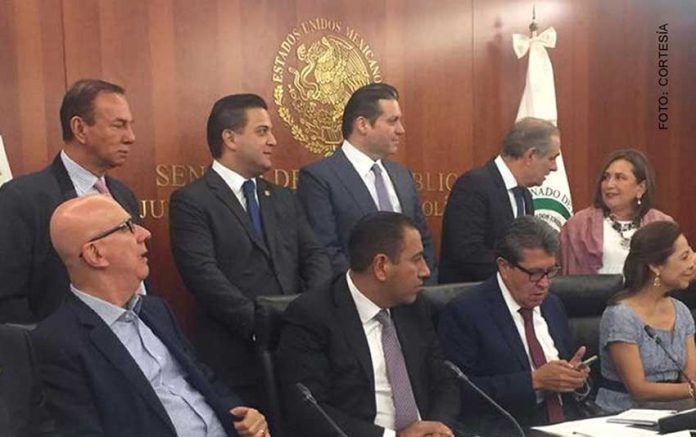Federal senators have reached an agreement that will see the government’s national guard proposal pass unanimously in the upper house of Congress.
After days of intense negotiations, lawmakers from the ruling Morena party and its coalition partners reached a deal with opposition party senators in the early hours of this morning.
The agreement is based on the national guard being a civil force with a civilian command rather than a military one although soldiers and marines will be permitted to be members for a maximum of five years after its creation.
“For five years following the entry into force of this decree, while the national guard develops its structure, capacities and territorial establishment, the president of the republic will be able to make use of the permanent armed forces in public security tasks in an extraordinary, regulated, controlled, subordinated and complementary way,” the modified proposal says.
Until 2023, the secretariats of National Defense (Sedena) and the Navy (Semar) will cooperate with the Secretariat of Security and Citizen Protection (SSPC) to establish the “hierarchical structures [and] discipline regimes” of the new security force and share responsibility for recruitment and training, among other operational areas.
The national guard is expected to be on a par with the armed forces in terms of its professionalism and the salaries and benefits its members will be paid.
At a press conference this morning, Morena’s leader in the Senate stressed that the national guard will be a civil force.
“Let it be clear, the national guard will be of a civil nature, responsible for public security tasks as well as the preservation of public peace,” Ricardo Monreal said.
Leaders of all eight parties that entered into the agreement spoke of its importance to achieving improved security in Mexico and said it was the product of constructive dialogue and negotiation.
“We went from being a closed Congress to an open parliament. We heard different voices, even insults . . . but insisting on these types of mechanisms and open processes is worth it. I respect everyone equally and I respect each parliamentary group leader because they all contributed,” Monreal said.
Miguel Ángel Osorio Chong, a former interior secretary and the current leader of the Institutional Revolutionary Party (PRI) in the Senate, said the changes to the proposal would contribute to making the national guard “a better institution . . . an institution in accordance with human rights treaties [and] an institution with counterbalances and parliamentary control.”
Mauricio Kuri, Senate leader of the National Action Party (PAN), the party which had been most strongly opposed to the national guard’s creation, said the modified proposal “avoided the militarization” of the security force and guaranteed “respect for human rights.”
Earlier this week, the National Human Rights Commission urged members of Congress to put respect and protection for human rights first in the constitutional amendments that must be approved in order for the new security force to be created.
President López Obrador said this morning that he accepted the arrangement for the armed forces to leave the streets in five years and return to their barracks and expressed confidence that the national guard will be a success.
Once the Senate has formally approved the creation of the force, its decree will be returned to the lower house of Congress for review.
If approved by the Chamber of Deputies, state congresses must ratify the decree after which the government can promulgate it and go ahead with the creation of the national guard.
Source: El Economista (sp), Milenio (sp) El Universal (sp)
